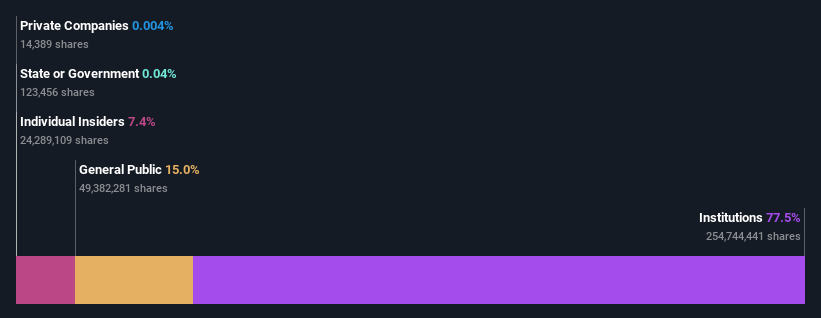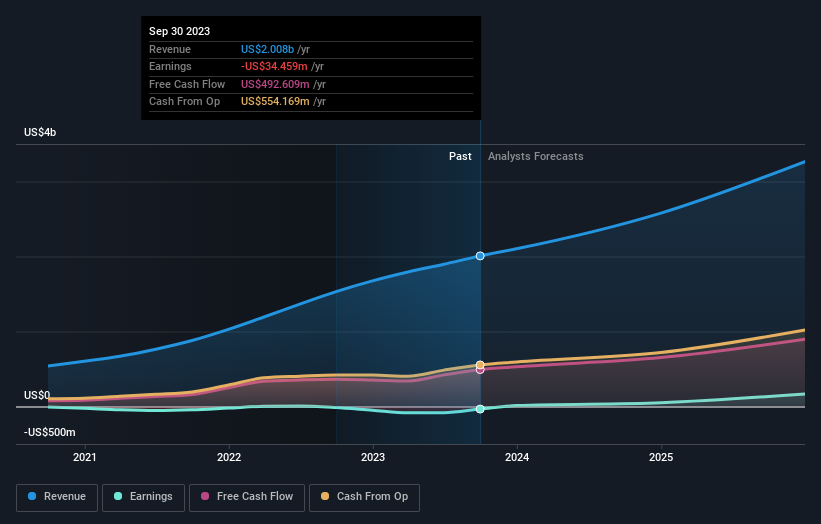Institutional investors have a lot riding on Datadog, Inc. (NASDAQ:DDOG) with 78% ownership
Key Insights
Institutions' substantial holdings in Datadog implies that they have significant influence over the company's share price
The top 24 shareholders own 50% of the company
Every investor in Datadog, Inc. (NASDAQ:DDOG) should be aware of the most powerful shareholder groups. The group holding the most number of shares in the company, around 78% to be precise, is institutions. That is, the group stands to benefit the most if the stock rises (or lose the most if there is a downturn).
And last week, institutional investors ended up benefitting the most after the company hit US$36b in market cap. The gains from last week would have further boosted the one-year return to shareholders which currently stand at 49%.
In the chart below, we zoom in on the different ownership groups of Datadog.
Check out our latest analysis for Datadog
What Does The Institutional Ownership Tell Us About Datadog?
Many institutions measure their performance against an index that approximates the local market. So they usually pay more attention to companies that are included in major indices.
We can see that Datadog does have institutional investors; and they hold a good portion of the company's stock. This suggests some credibility amongst professional investors. But we can't rely on that fact alone since institutions make bad investments sometimes, just like everyone does. It is not uncommon to see a big share price drop if two large institutional investors try to sell out of a stock at the same time. So it is worth checking the past earnings trajectory of Datadog, (below). Of course, keep in mind that there are other factors to consider, too.
Investors should note that institutions actually own more than half the company, so they can collectively wield significant power. We note that hedge funds don't have a meaningful investment in Datadog. The Vanguard Group, Inc. is currently the largest shareholder, with 8.1% of shares outstanding. BlackRock, Inc. is the second largest shareholder owning 5.4% of common stock, and RTP Ventures holds about 3.7% of the company stock. In addition, we found that Olivier Pomel, the CEO has 2.7% of the shares allocated to their name.
A closer look at our ownership figures suggests that the top 24 shareholders have a combined ownership of 50% implying that no single shareholder has a majority.
Researching institutional ownership is a good way to gauge and filter a stock's expected performance. The same can be achieved by studying analyst sentiments. There are plenty of analysts covering the stock, so it might be worth seeing what they are forecasting, too.
Insider Ownership Of Datadog
The definition of company insiders can be subjective and does vary between jurisdictions. Our data reflects individual insiders, capturing board members at the very least. The company management answer to the board and the latter should represent the interests of shareholders. Notably, sometimes top-level managers are on the board themselves.
Insider ownership is positive when it signals leadership are thinking like the true owners of the company. However, high insider ownership can also give immense power to a small group within the company. This can be negative in some circumstances.
We can report that insiders do own shares in Datadog, Inc.. It is a very large company, and board members collectively own US$2.7b worth of shares (at current prices). Most would say this shows a good alignment of interests between shareholders and the board. Still, it might be worth checking if those insiders have been selling.
General Public Ownership
With a 15% ownership, the general public, mostly comprising of individual investors, have some degree of sway over Datadog. While this group can't necessarily call the shots, it can certainly have a real influence on how the company is run.
Next Steps:
I find it very interesting to look at who exactly owns a company. But to truly gain insight, we need to consider other information, too. For example, we've discovered 2 warning signs for Datadog that you should be aware of before investing here.
But ultimately it is the future, not the past, that will determine how well the owners of this business will do. Therefore we think it advisable to take a look at this free report showing whether analysts are predicting a brighter future.
NB: Figures in this article are calculated using data from the last twelve months, which refer to the 12-month period ending on the last date of the month the financial statement is dated. This may not be consistent with full year annual report figures.
Have feedback on this article? Concerned about the content? Get in touch with us directly. Alternatively, email editorial-team (at) simplywallst.com.
This article by Simply Wall St is general in nature. We provide commentary based on historical data and analyst forecasts only using an unbiased methodology and our articles are not intended to be financial advice. It does not constitute a recommendation to buy or sell any stock, and does not take account of your objectives, or your financial situation. We aim to bring you long-term focused analysis driven by fundamental data. Note that our analysis may not factor in the latest price-sensitive company announcements or qualitative material. Simply Wall St has no position in any stocks mentioned.

 Yahoo Finance
Yahoo Finance 

